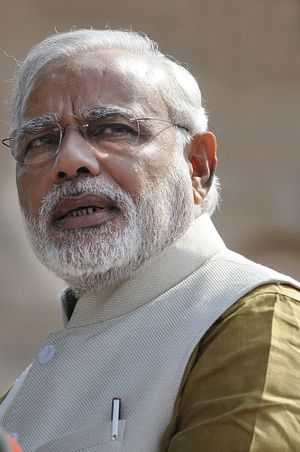Some 24 hours before he arrives in the United States on his first visit to the country as prime minster, the U.S. Federal Court of the Southern District of New York issued a summons against Narendra Modi regarding his alleged involvement in the 2002 Godhra riots, in his home state of Gujarat. The summons requires Modi to respond within 21 days of receipt, barring which the court will decide in default against Modi for the damages sought by the plaintiffs. According to The Hindu, the summons “charges PM Modi with committing crimes against humanity, extra-judicial killings, torture and inflicting mental and physical trauma on the victims, mostly from the Muslim community.”
The summons was issued in connection with a lawsuit filed by the American Justice Center (AJC), a non-profit human rights organization representing the plaintiffs in the case who have been described as “two survivors of the horrific and organised violence of Gujarat 2002.” The riots in question took place under Modi’s tenure as chief minister of Gujarat. While the Supreme Court of India found no evidence of Modi’s complicity in enabling the riots, many of the prime minister’s critics allege that his inaction allowed several hundred Muinlims to perish at the hands of Hindu rioters. The Indian government’s official death toll of the riots counts 790 Muslims and 254 Hindus among the victims. Another 2500 were injured and 223 were reported missing.
According to the plaintiffs, the case carries legal weight in the United States under the Alien Tort Statute, a 1789 federal law that grants U.S. federal courts the power to “hear lawsuits filed by U.S. residents for acts committed in violation of international law outside the U.S.” The summons is required of the court in order to impose its jurisdiction.
The summons is already making headlines in India and could negatively color Modi’s trip to the United States. Modi was famously denied a U.S. visa in 2005 when he was the chief minister of Gujarat, leading many to question how the United States would respond should he win the election for India’s top political office. The U.S. government and legislators have been nothing but positive about Modi’s leadership since his election, but the summons will bring to the surface issues that the Indian government would rather avoid during Modi’s inaugural visit to the United States as prime minister. The United States denied Modi a visa in 2005 under a little-invoked U.S. law on religious freedom. As of today, Modi remains the only person to have ever been denied a visa to the United States under that law.
In addition to the summons, other human rights groups are expected to protest Modi’s visit to the United States on similar grounds. Representatives of the Coalition Against Genocide will protest Modi’s highly anticipated speech in New York City’s Madison Square Garden, where he will address a crowd of 20,000–mostly Indian Americans.
The Indian government has yet to react to the summons. It is possible that the summons could lead to an extremely negative reaction in India. Modi and his party, the Hindu nationalist Bharatiya Janata Party, came to power with the strongest democratic mandate in India in decades. The incident could emerge as a major symbolic inhibitor to closer U.S.-India ties, much in the same way that the arrest of an Indian diplomat in New York late last year spiraled into a major diplomatic crisis.
It should be noted that Modi isn’t the first Indian leader to receive a court summons from the United States. Last year, the federal court of the Eastern District of New York served Sonia Gandhi, the leader of the Indian National Congress (INC), with a summons in connection with her alleged “leading role in shielding the members, office bearers, leaders and supporters of her party that played an active role in the Genocide.” That lawsuit was filed by Sikhs for Justice, a U.S.-based non-profit representing Sikh interests. Sonia Gandhi’s mother-in-law Indira Gandhi, an Indian prime minister, was assassinated by her Sikh bodyguards following Operation Bluestar, a controversial Indian military operation against separatist Sikhs. In retaliation for her assassination, over 3,000 Sikhs were targeted in riots across the country. The plaintiffs in that lawsuit allege that Gandhi is complicit in shielding members of the INC who were involved in the riots. That lawsuit was also filed under the Alien Tort Statute.

































